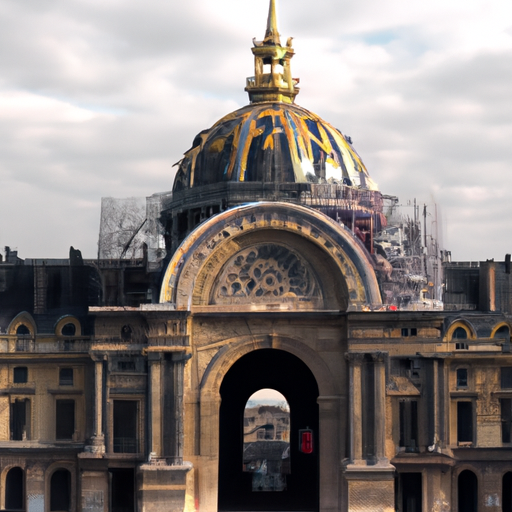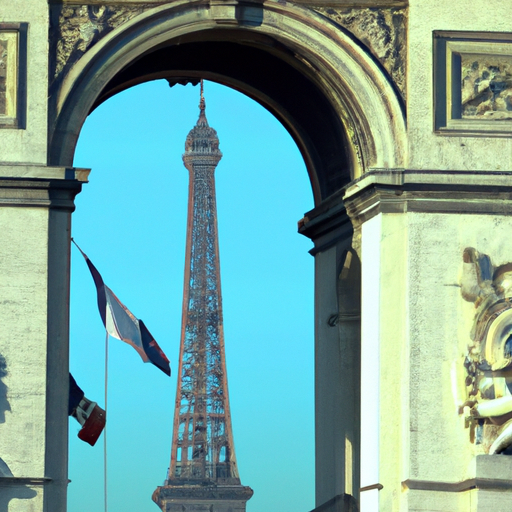
Luxury Hotel Market in France: A Key Driver of Global RevPAR Growth
France’s Hotels Leading Global RevPAR Growth
When it comes to luxury hotels, France is undoubtedly a key player in the global market. With its rich history, stunning architecture, and world-class cuisine, it’s no wonder that tourists from all over the world flock to this beautiful country. And it’s not just the tourists who are benefiting from France’s thriving luxury hotel market – the industry itself is experiencing significant growth, with France’s hotels leading the way in global RevPAR (Revenue per Available Room) growth.
RevPAR is a key metric used in the hotel industry to measure a hotel’s financial performance. It is calculated by dividing a hotel’s total room revenue by the number of available rooms. A higher RevPAR indicates that a hotel is generating more revenue per room, which is a positive sign for the industry as a whole.
In recent years, France’s luxury hotel market has been experiencing impressive growth in RevPAR. According to a report by STR, a leading provider of data and analytics for the global hotel industry, France’s luxury hotels saw a 6.8% increase in RevPAR in 2019, outperforming other major markets such as the United States, the United Kingdom, and Germany.
So, what is driving this growth in France’s luxury hotel market? One of the key factors is the country’s strong tourism industry. France is one of the most visited countries in the world, attracting millions of tourists each year. The country’s rich cultural heritage, iconic landmarks such as the Eiffel Tower and the Louvre Museum, and its reputation for fine dining and fashion make it a top destination for travelers seeking a luxurious experience.
In addition to its strong tourism industry, France’s luxury hotels are also benefiting from increased demand from business travelers. The country is home to numerous multinational corporations and hosts a large number of international conferences and events. This has led to a growing demand for high-end accommodation options, and France’s luxury hotels are stepping up to meet this demand.
Another factor contributing to France’s leading position in global RevPAR growth is the country’s commitment to excellence in hospitality. French luxury hotels are known for their impeccable service, attention to detail, and luxurious amenities. From the moment guests step foot into these hotels, they are greeted with warmth and professionalism, ensuring a memorable and enjoyable stay.
Furthermore, France’s luxury hotels are constantly innovating and investing in their properties to stay ahead of the competition. Many hotels have undergone extensive renovations to update their facilities and enhance the guest experience. From state-of-the-art spas and fitness centers to Michelin-starred restaurants and rooftop bars with breathtaking views, these hotels are constantly raising the bar when it comes to luxury accommodation.
In conclusion, France’s luxury hotel market is a key driver of global RevPAR growth. With its strong tourism industry, increased demand from business travelers, commitment to excellence in hospitality, and constant innovation, France’s hotels are leading the way in generating higher revenue per available room. Whether you’re a tourist looking for a luxurious getaway or a business traveler in need of top-notch accommodation, France’s luxury hotels are sure to exceed your expectations. So, why not indulge yourself in the ultimate luxury experience and book your stay at one of France’s world-class hotels?
Sustainable Practices in French Hotels: Contributing to Global RevPAR Growth

France’s Hotels Leading Global RevPAR Growth
When it comes to sustainable practices in the hospitality industry, French hotels are leading the way. Not only are they setting an example for other countries, but they are also contributing to the global growth of Revenue per Available Room (RevPAR). With their commitment to sustainability, French hotels are attracting environmentally conscious travelers who are willing to pay a premium for eco-friendly accommodations.
One of the key sustainable practices that French hotels have adopted is energy efficiency. Many hotels in France have implemented energy-saving measures such as LED lighting, motion sensors, and smart thermostats. By reducing their energy consumption, these hotels are not only reducing their carbon footprint but also saving on operational costs. This allows them to offer competitive rates to their guests while still maintaining profitability.
In addition to energy efficiency, French hotels are also focusing on waste reduction. They have implemented recycling programs and are using eco-friendly products and materials. Some hotels have even gone a step further by composting organic waste and using it to fertilize their gardens. By minimizing waste and promoting recycling, these hotels are not only reducing their impact on the environment but also contributing to the circular economy.
Water conservation is another area where French hotels are excelling. Many hotels have installed water-saving fixtures such as low-flow showerheads and toilets. They have also implemented water management systems to monitor and control water usage. By conserving water, these hotels are not only reducing their environmental impact but also saving on water bills. This allows them to offer competitive rates to their guests while still providing a high level of service.
French hotels are also embracing sustainable food practices. Many hotels have partnered with local farmers and suppliers to source fresh, organic, and locally produced ingredients. They are also reducing food waste by implementing portion control and offering guests the option to choose their own portion sizes. By promoting sustainable food practices, these hotels are not only supporting local communities but also providing guests with a unique culinary experience.
Furthermore, French hotels are investing in renewable energy sources. Some hotels have installed solar panels on their rooftops to generate clean energy. Others have partnered with local renewable energy providers to purchase green energy. By investing in renewable energy, these hotels are not only reducing their carbon footprint but also supporting the transition to a more sustainable energy system.
The sustainable practices adopted by French hotels are not only benefiting the environment but also contributing to the global growth of RevPAR. Travelers are increasingly seeking eco-friendly accommodations, and French hotels are meeting this demand. By offering sustainable practices, these hotels are attracting environmentally conscious travelers who are willing to pay a premium for eco-friendly accommodations. This has resulted in increased occupancy rates and higher average daily rates, leading to a growth in RevPAR.
In conclusion, French hotels are leading the way in sustainable practices in the hospitality industry. Their commitment to energy efficiency, waste reduction, water conservation, sustainable food practices, and renewable energy sources is setting an example for other countries. Not only are these practices benefiting the environment, but they are also contributing to the global growth of RevPAR. With their focus on sustainability, French hotels are attracting environmentally conscious travelers and reaping the rewards of their commitment to a greener future.
The Rise of Boutique Hotels in France: Impact on Global RevPAR Growth
France’s Hotels Leading Global RevPAR Growth
France has long been known for its rich history, stunning architecture, and world-class cuisine. But in recent years, it has also emerged as a leader in the global hotel industry, with its boutique hotels playing a significant role in driving the growth of Revenue per Available Room (RevPAR) worldwide.
The rise of boutique hotels in France has been nothing short of remarkable. These small, stylish, and often independently owned establishments have captured the hearts of travelers seeking a unique and personalized experience. With their attention to detail, personalized service, and distinctive design, boutique hotels have become a favorite choice for discerning travelers looking for more than just a place to rest their heads.
One of the key factors contributing to the success of boutique hotels in France is their ability to offer a sense of authenticity and local flavor. Unlike large chain hotels, which often have a standardized look and feel, boutique hotels are known for their individuality and charm. From converted chateaus to renovated farmhouses, each boutique hotel in France has its own story to tell, making every stay a truly memorable one.
Another reason why boutique hotels in France are leading the global RevPAR growth is their focus on providing exceptional service. With a smaller number of rooms to manage, boutique hotels can offer a more personalized and attentive experience to their guests. From the moment they step through the door, guests are greeted by friendly staff who go above and beyond to ensure their stay is nothing short of perfect. Whether it’s arranging a private tour of a local vineyard or recommending the best hidden gems in the city, boutique hotels in France are known for their dedication to creating unforgettable experiences.
In addition to their unique design and exceptional service, boutique hotels in France also benefit from their prime locations. Many of these hotels are situated in the heart of historic cities, offering guests easy access to popular attractions, restaurants, and shops. Whether it’s strolling along the Seine in Paris or exploring the charming streets of Provence, guests staying at boutique hotels in France can immerse themselves in the local culture and truly experience the essence of the destination.
The impact of boutique hotels in France on global RevPAR growth cannot be overstated. According to a recent report by STR, a leading provider of hotel data and analytics, France’s hotels experienced a 4.6% increase in RevPAR in 2019, outperforming the global average of 1.1%. This growth can largely be attributed to the success of boutique hotels, which have attracted a growing number of international travelers seeking a more authentic and personalized experience.
As the global hotel industry continues to evolve, boutique hotels in France are poised to play an even more significant role in driving RevPAR growth. With their unique design, exceptional service, and prime locations, these hotels offer a compelling alternative to traditional chain hotels. Whether it’s a romantic getaway, a cultural adventure, or a culinary exploration, boutique hotels in France are sure to leave a lasting impression on travelers from around the world. So, the next time you’re planning a trip to France, consider staying at a boutique hotel and experience firsthand why they are leading the way in global RevPAR growth.


